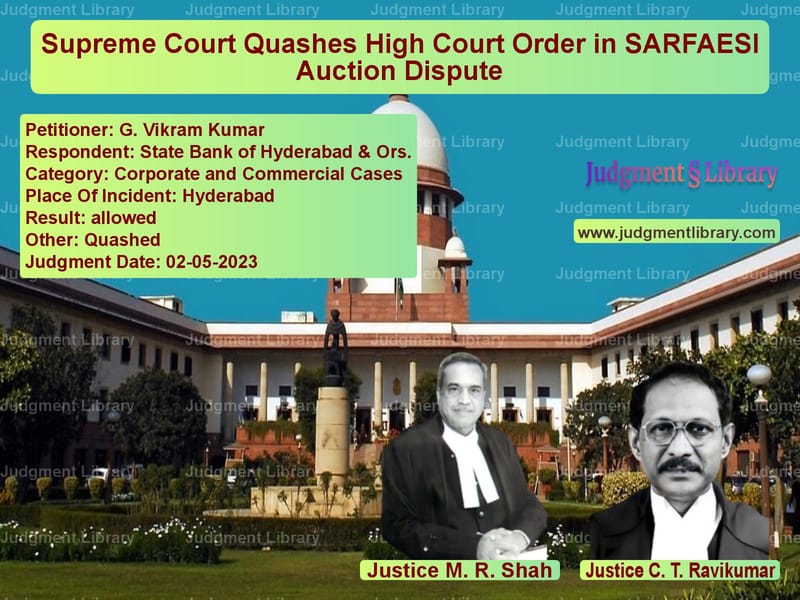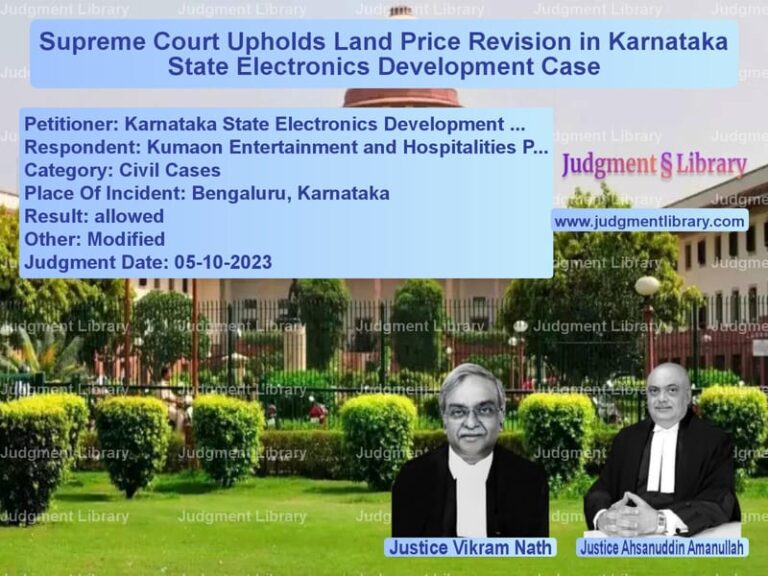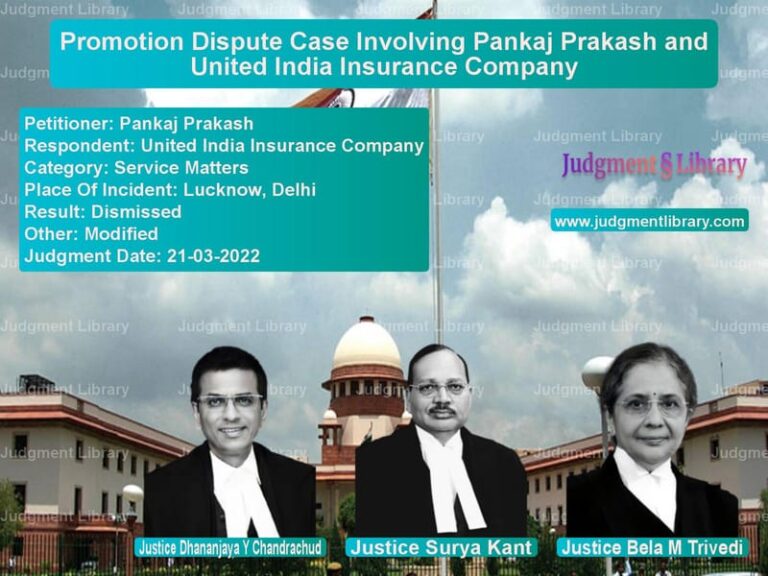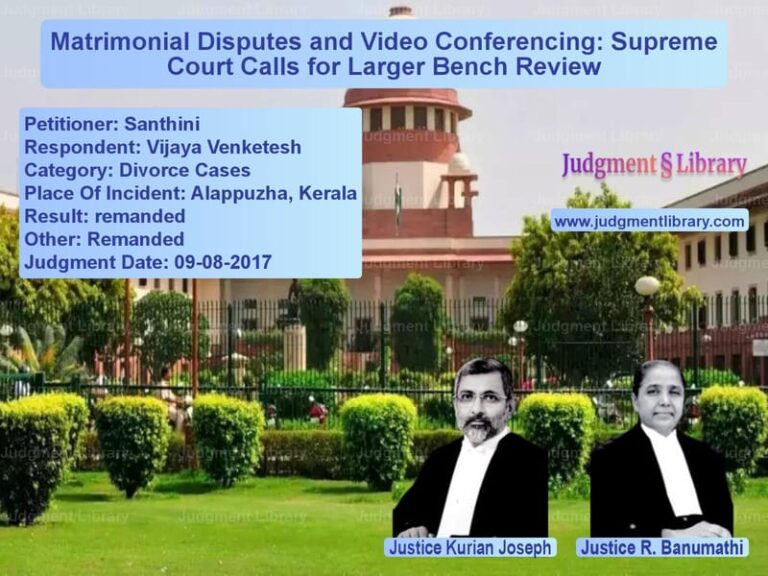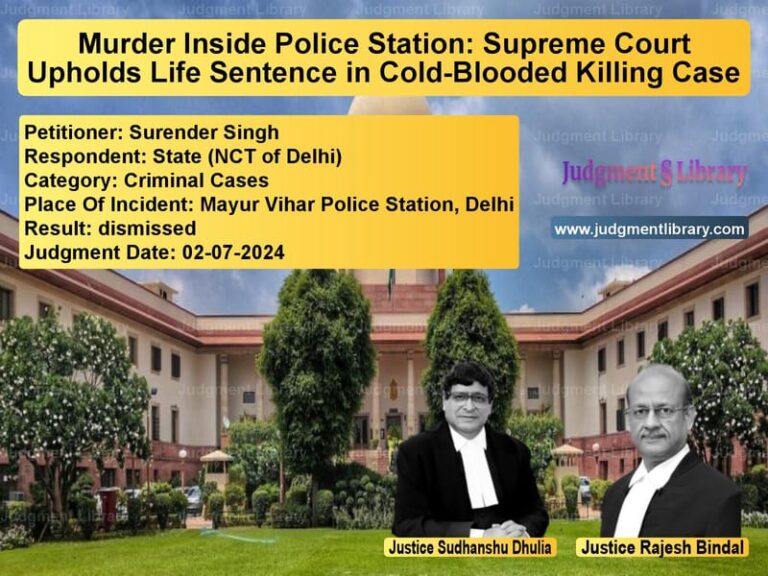Supreme Court Quashes High Court Order in SARFAESI Auction Dispute
The Supreme Court of India has delivered a crucial judgment in the case of G. Vikram Kumar v. State Bank of Hyderabad & Ors., dealing with the rights of an auction purchaser under the Securitization and Reconstruction of Financial Assets and Enforcement of Security Interest Act, 2002 (SARFAESI Act). The case involved a dispute over a bank auction, with the Supreme Court setting aside the High Court’s ruling, reinforcing the legal sanctity of auctions conducted under the SARFAESI Act.
Background of the Case
The dispute arose when respondent no.3 (a builder) took a loan from State Bank of Hyderabad for a housing project but failed to repay it. The bank initiated proceedings under Section 13 of the SARFAESI Act and took possession of the builder’s property. Several flats in the project, including Flat No. 6401, were listed for auction.
As part of the legal proceedings:
- The builder challenged the bank’s actions in the Debt Recovery Tribunal (DRT) but was allowed to provide a list of flats sold to third parties.
- The DRT permitted the bank to auction the remaining flats, excluding seven identified by the builder.
- Flat No. 6401 was not on the exclusion list, making it eligible for auction.
Dispute Over the Sale of Flat No. 6401
The legal dispute intensified when respondent no.1 (an individual claiming rights over the property) entered into a Memorandum of Understanding (MoU) with the builder on April 10, 2016, agreeing to purchase Flat No. 6401 for ₹45 lakhs.
Key developments:
- Respondent no.1 had knowledge of the pending bank proceedings but went ahead with the sale agreement.
- The bank issued a public auction notice on July 28, 2016, listing Flat No. 6401 for sale.
- The auction was conducted on August 31, 2016, with the appellant, G. Vikram Kumar, emerging as the successful bidder.
- The appellant paid 25% of the bid amount, and the bank issued a confirmation receipt.
Legal Proceedings Before the High Court
After the auction, respondent no.1 filed a writ petition in the High Court of Hyderabad on September 14, 2016, challenging the auction notice and seeking protection under Section 13(8) of the SARFAESI Act.
The High Court ruled in favor of respondent no.1, stating that:
- The respondent had deposited the full sale consideration.
- The sale agreement with the builder gave the respondent a valid interest in the property.
- The auction sale should be set aside to prevent undue hardship to respondent no.1.
Appeal to the Supreme Court
The appellant, being the successful auction purchaser, challenged the High Court’s ruling in the Supreme Court. His arguments included:
- The High Court should not have entertained the writ petition, as the SARFAESI Act provides an alternative remedy under Section 17, which respondent no.1 did not pursue.
- The bank had lawfully auctioned the property, and the High Court’s order amounted to granting specific performance of an unregistered sale agreement.
- The respondent was aware of the pending proceedings and should not have entered into the sale agreement.
- The Debt Recovery Tribunal (DRT) had already declared the sale agreement void, as it was executed without the bank’s consent.
Respondent No.1’s Counterarguments
The respondent argued that:
- Under Section 13(8) of the SARFAESI Act, they had the right to redeem the property by paying the full amount before the sale was confirmed.
- Since the full amount was deposited before the auction sale was finalized, the High Court’s decision was justified.
- The respondent’s family had been residing in the property, and their eviction would cause significant hardship.
Supreme Court’s Observations and Ruling
The Supreme Court ruled in favor of the appellant, making the following key observations:
1. Writ Petition Not Maintainable
- Challenges to SARFAESI proceedings should be raised under Section 17 before the Debt Recovery Tribunal (DRT), not through a writ petition.
- The High Court erred in entertaining the writ petition when a statutory remedy was available.
2. Sale Agreement Was Void
- The agreement between respondent no.1 and the builder was executed without the bank’s consent and during pending recovery proceedings.
- The DRT had already ruled that any sale without permission was void.
3. Section 13(8) of SARFAESI Act Did Not Apply
- For Section 13(8) to apply, the borrower must clear the full dues before the auction.
- In this case, the borrower did not clear the dues, and respondent no.1 had no legal standing to invoke Section 13(8).
4. Rights of the Auction Purchaser
- The appellant lawfully acquired the property through a valid auction.
- The Supreme Court upheld the principle that auction sales conducted under SARFAESI cannot be interfered with lightly.
Final Verdict
The Supreme Court:
- Set aside the High Court’s ruling.
- Directed that the appellant complete the payment and be issued a sale certificate for Flat No. 6401.
- Ordered that respondent no.1’s family vacate the premises within three months.
- Directed the bank to refund the amount deposited by respondent no.1, with interest.
Key Takeaways from the Judgment
- Statutory remedies under the SARFAESI Act must be followed; High Courts should not entertain writ petitions when alternative remedies exist.
- Sale agreements executed without the bank’s consent are void, especially when SARFAESI proceedings are pending.
- Section 13(8) does not apply to third-party purchasers; only borrowers can invoke it to redeem the property.
- Auction purchasers’ rights are legally protected; valid auctions cannot be overturned arbitrarily.
- The SARFAESI Act strengthens financial institutions’ ability to recover debts and should not be diluted by judicial intervention in favor of defaulting borrowers.
Conclusion
The Supreme Court’s judgment in G. Vikram Kumar v. State Bank of Hyderabad reinforces the importance of following statutory procedures under the SARFAESI Act. By quashing the High Court’s order, the Court has upheld the rights of an auction purchaser and emphasized that judicial interference should not override statutory remedies. This ruling sets a strong precedent for future cases involving auction disputes under the SARFAESI Act.
Read also: https://judgmentlibrary.com/supreme-court-rules-on-change-in-law-compensation-for-power-companies/
Petitioner Name: G. Vikram Kumar.Respondent Name: State Bank of Hyderabad & Ors..Judgment By: Justice M. R. Shah, Justice C. T. Ravikumar.Place Of Incident: Hyderabad.Judgment Date: 02-05-2023.
Don’t miss out on the full details! Download the complete judgment in PDF format below and gain valuable insights instantly!
Download Judgment: g.-vikram-kumar-vs-state-bank-of-hydera-supreme-court-of-india-judgment-dated-02-05-2023.pdf
Directly Download Judgment: Directly download this Judgment
See all petitions in Bankruptcy and Insolvency
See all petitions in Corporate Compliance
See all petitions in Judgment by Mukeshkumar Rasikbhai Shah
See all petitions in Judgment by C.T. Ravikumar
See all petitions in allowed
See all petitions in Quashed
See all petitions in supreme court of India judgments May 2023
See all petitions in 2023 judgments
See all posts in Corporate and Commercial Cases Category
See all allowed petitions in Corporate and Commercial Cases Category
See all Dismissed petitions in Corporate and Commercial Cases Category
See all partially allowed petitions in Corporate and Commercial Cases Category

